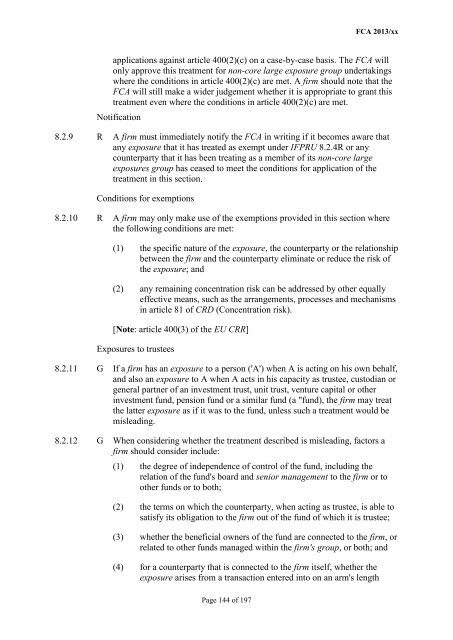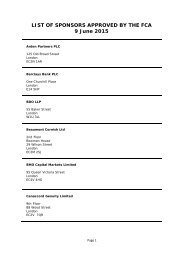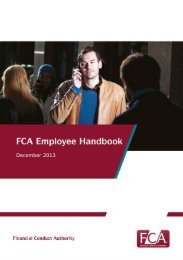- Page 1:
Financial Conduct Authority Consult
- Page 4 and 5:
We are asking for comments on this
- Page 6 and 7:
CP13/6 CRD IV for Investment Firms
- Page 8 and 9:
CP13/6 CRD IV for Investment Firms
- Page 10 and 11:
CP13/6 CRD IV for Investment Firms
- Page 12 and 13:
CP13/6 CRD IV for Investment Firms
- Page 14 and 15:
CP13/6 CRD IV for Investment Firms
- Page 16 and 17:
CP13/6 CRD IV for Investment Firms
- Page 18 and 19:
CP13/6 CRD IV for Investment Firms
- Page 20 and 21:
CP13/6 CRD IV for Investment Firms
- Page 22 and 23:
CP13/6 CRD IV for Investment Firms
- Page 24 and 25:
CP13/6 CRD IV for Investment Firms
- Page 26 and 27:
CP13/6 CRD IV for Investment Firms
- Page 28 and 29:
CP13/6 CRD IV for Investment Firms
- Page 30 and 31:
CP13/6 CRD IV for Investment Firms
- Page 32 and 33:
CP13/6 CRD IV for Investment Firms
- Page 34 and 35:
CP13/6 CRD IV for Investment Firms
- Page 36 and 37:
CP13/6 CRD IV for Investment Firms
- Page 38 and 39:
CP13/6 CRD IV for Investment Firms
- Page 40 and 41:
CP13/6 CRD IV for Investment Firms
- Page 42 and 43:
CP13/6 CRD IV for Investment Firms
- Page 44 and 45:
CP13/6 CRD IV for Investment Firms
- Page 46 and 47:
CP13/6 CRD IV for Investment Firms
- Page 48 and 49:
CP13/6 CRD IV for Investment Firms
- Page 50 and 51:
CP13/6 CRD IV for Investment Firms
- Page 52 and 53:
CP13/6 CRD IV for Investment Firms
- Page 54 and 55:
CP13/6 CRD IV for Investment Firms
- Page 56 and 57:
CP13/6 CRD IV for Investment Firms
- Page 58 and 59:
CP13/6 CRD IV for Investment Firms
- Page 60 and 61:
CP13/6 CRD IV for Investment Firms
- Page 63 and 64:
CRD IV for Investment Firms CP13/6
- Page 65 and 66:
CRD IV for Investment Firms CP13/6
- Page 67 and 68:
CRD IV for Investment Firms CP13/6
- Page 69 and 70:
CRD IV for Investment Firms CP13/6
- Page 71 and 72:
CRD IV for Investment Firms CP13/6
- Page 73 and 74:
CRD IV for Investment Firms CP13/6
- Page 75 and 76:
CRD IV for Investment Firms CP13/6
- Page 77 and 78:
CRD IV for Investment Firms CP13/6
- Page 79 and 80:
CRD IV for Investment Firms CP13/6
- Page 81 and 82:
CRD IV for Investment Firms CP13/6
- Page 83 and 84:
CRD IV for Investment Firms CP13/6
- Page 85 and 86:
CRD IV for Investment Firms CP13/6
- Page 87 and 88:
CRD IV for Investment Firms CP13/6
- Page 89 and 90:
CRD IV for Investment Firms CP13/6
- Page 91 and 92:
CRD IV for Investment Firms CP13/6
- Page 93 and 94:
CRD IV for Investment Firms CP13/6
- Page 95 and 96:
CRD IV for Investment Firms CP13/6
- Page 97 and 98:
CRD IV for Investment Firms CP13/6
- Page 99 and 100:
FCA 2013/xx Annex A Prudential sour
- Page 101 and 102:
FCA 2013/xx (a) (b) deal on own acc
- Page 103 and 104:
FCA 2013/xx 1.1.14 G A firm also fa
- Page 105 and 106:
FCA 2013/xx connected with, its reg
- Page 107 and 108:
FCA 2013/xx 2.1 Application 2.1.1 R
- Page 109 and 110:
FCA 2013/xx (a) (b) (c) the nature
- Page 111 and 112:
FCA 2013/xx losses because its inco
- Page 113 and 114:
FCA 2013/xx 2.2.18 R A firm must ha
- Page 115 and 116:
FCA 2013/xx [Note: article 83(3) of
- Page 117 and 118:
FCA 2013/xx (b) (c) sudden and seve
- Page 119 and 120:
FCA 2013/xx (b) provide the resolut
- Page 121 and 122:
FCA 2013/xx between each firm which
- Page 123 and 124:
FCA 2013/xx in a number of risk cat
- Page 125 and 126:
FCA 2013/xx Capital planning 2.2.73
- Page 127 and 128:
FCA 2013/xx approving and actioning
- Page 129 and 130:
FCA 2013/xx financial situations or
- Page 131 and 132:
FCA 2013/xx activities (IFPRU 2.2.1
- Page 133 and 134:
FCA 2013/xx suggested. 2.3.17 G The
- Page 135 and 136:
FCA 2013/xx (3) what plan is in pla
- Page 137 and 138:
FCA 2013/xx 2.3.35 G For a firm tha
- Page 139 and 140:
FCA 2013/xx that considers the poss
- Page 141 and 142:
FCA 2013/xx unexpected cash flows l
- Page 143 and 144:
FCA 2013/xx (1) a failure by a firm
- Page 145 and 146:
FCA 2013/xx single counterparty; (b
- Page 147 and 148:
FCA 2013/xx (4) that it has in plac
- Page 149 and 150:
FCA 2013/xx that firm. Calculation
- Page 151 and 152:
FCA 2013/xx 3.2.8 R A firm must dem
- Page 153 and 154:
FCA 2013/xx 126(2), 178(1)(b), 243(
- Page 155 and 156:
FCA 2013/xx (1) whether there is an
- Page 157 and 158:
FCA 2013/xx 4.3.8 G A significant I
- Page 159 and 160:
FCA 2013/xx set out but are outside
- Page 161 and 162:
FCA 2013/xx requirements in article
- Page 163 and 164:
FCA 2013/xx standards for data qual
- Page 165 and 166:
FCA 2013/xx Definition of default:
- Page 167 and 168:
FCA 2013/xx Variable scalar conside
- Page 169 and 170:
FCA 2013/xx Data considerations 4.3
- Page 171 and 172:
FCA 2013/xx (b) (c) (eg, external a
- Page 173 and 174:
FCA 2013/xx will allow such cures t
- Page 175 and 176:
FCA 2013/xx and not be based purely
- Page 177 and 178:
FCA 2013/xx downturn conditions, a
- Page 179 and 180:
FCA 2013/xx Direct estimates of EAD
- Page 181 and 182:
FCA 2013/xx Netting 4.3.119 G For c
- Page 183 and 184:
FCA 2013/xx 4.3.131 G As with all a
- Page 185 and 186:
FCA 2013/xx Low default portfolios
- Page 187 and 188:
FCA 2013/xx Other requirements 4.3.
- Page 189 and 190: FCA 2013/xx 4.4.4 G A firm should n
- Page 191 and 192: FCA 2013/xx significant risk transf
- Page 193 and 194: FCA 2013/xx risk transfer notificat
- Page 195 and 196: FCA 2013/xx EU CRR) should be revie
- Page 197 and 198: FCA 2013/xx being recognised or the
- Page 199 and 200: FCA 2013/xx with traded debt instru
- Page 201 and 202: FCA 2013/xx Duration of the credit
- Page 203 and 204: FCA 2013/xx Track record and financ
- Page 205 and 206: FCA 2013/xx Pledge of assets, takin
- Page 207 and 208: FCA 2013/xx complete and stabilised
- Page 209 and 210: FCA 2013/xx properties are diversif
- Page 211 and 212: FCA 2013/xx assets are highly liqui
- Page 213 and 214: FCA 2013/xx market asset when it co
- Page 215 and 216: FCA 2013/xx Financial strength of t
- Page 217 and 218: FCA 2013/xx (f) (g) The effect of t
- Page 219 and 220: FCA 2013/xx (2) contains the rule t
- Page 221 and 222: FCA 2013/xx 6.1.8 G The pricing mod
- Page 223 and 224: FCA 2013/xx 6.2.3 G Futures, forwar
- Page 225 and 226: FCA 2013/xx 6.2.11 G This table bel
- Page 227 and 228: FCA 2013/xx (b) (c) equal to a frac
- Page 229 and 230: FCA 2013/xx demonstrate this by hav
- Page 231 and 232: FCA 2013/xx shifts for both VaR and
- Page 233 and 234: FCA 2013/xx individual basis if it
- Page 235 and 236: FCA 2013/xx material practical or l
- Page 237 and 238: FCA 2013/xx the financial situation
- Page 239: FCA 2013/xx consolidated situation
- Page 243 and 244: FCA 2013/xx Calculation of counterc
- Page 245 and 246: FCA 2013/xx connection with common
- Page 247 and 248: FCA 2013/xx “Qn” indicates the
- Page 249 and 250: FCA 2013/xx [9.7 Exemptions 9.7.1 G
- Page 251 and 252: FCA 2013/xx Permission 1 Internal R
- Page 253 and 254: FCA 2013/xx consolidated basis for
- Page 255 and 256: FCA 2013/xx 15 Own funds requiremen
- Page 257 and 258: FCA 2013/xx 3.4 R For the purposes
- Page 259 and 260: FCA 2013/xx (4) 40% for the period
- Page 261 and 262: FCA 2013/xx (3) 0.6 during the peri
- Page 263 and 264: FCA 2013/xx IFPRU 9.3 (Countercycli
- Page 265 and 266: FCA 2013/xx 3.2.6R enter into a con
- Page 267 and 268: FCA 2013/xx group members in excess
- Page 269 and 270: FCA 2013/xx FCA to grant a waiver t
- Page 271 and 272: FCA 2013/xx consolidated basis cons
- Page 273 and 274: FCA 2013/xx that is not excluded un
- Page 275 and 276: FCA 2013/xx third country countercy
- Page 277 and 278: FCA 2013/xx purpose of BIPRU 10 (La
- Page 279 and 280: FCA 2013/xx (ii) any private or pub
- Page 281 and 282: FCA 2013/xx EEA prudential sectoral
- Page 283 and 284: FCA 2013/xx financial instrument (1
- Page 285 and 286: FCA 2013/xx (2) (in accordance with
- Page 287 and 288: FCA 2013/xx basis under Article 73(
- Page 289 and 290: FCA 2013/xx (3) (in BIPRU 12 (Liqui
- Page 291 and 292:
FCA 2013/xx 2.3 (Supervisory review
- Page 293 and 294:
FCA 2013/xx Annex C Amendments to t
- Page 295 and 296:
FCA 2013/xx CAPITAL REQUIREMENTS DI
- Page 297 and 298:
FCA 2013/xx (b) has a branch in the
- Page 299 and 300:
FCA 2013/xx 1.3 Valuation … … P
- Page 301 and 302:
FCA 2013/xx … Calculation of the
- Page 303 and 304:
FCA 2013/xx The table in GENPRU 2.1
- Page 305 and 306:
FCA 2013/xx ... … 2.2.220R; GENPR
- Page 307 and 308:
FCA 2013/xx … Limits on the use o
- Page 309 and 310:
FCA 2013/xx Core tier one capital:
- Page 311 and 312:
FCA 2013/xx 6R consolidated supervi
- Page 313 and 314:
FCA 2013/xx 8.13 R … … IPRU(BSO
- Page 315 and 316:
FCA 2013/xx 8B.3 R The Royal Bank o
- Page 317 and 318:
FCA 2013/xx GENPRU 2.2.174R GENPRU
- Page 319 and 320:
FCA 2013/xx 1.1.5 G Guidance on the
- Page 321 and 322:
FCA 2013/xx … (da) (e) (f) apply
- Page 323 and 324:
FCA 2013/xx purpose of the 5% test
- Page 325 and 326:
FCA 2013/xx as it applies to the IR
- Page 327 and 328:
FCA 2013/xx applicable, the Banking
- Page 329 and 330:
FCA 2013/xx … 8.3.14 G The financ
- Page 331 and 332:
FCA 2013/xx GENPRU 2 Annex 6R requi
- Page 333 and 334:
FCA 2013/xx … 8.6 Consolidated ca
- Page 335 and 336:
FCA 2013/xx [deleted] 8.7.4 G BIPRU
- Page 337 and 338:
FCA 2013/xx apply differently for d
- Page 339 and 340:
FCA 2013/xx Part 1 (Non-EEA regulat
- Page 341 and 342:
FCA 2013/xx Disclosure: Operational
- Page 343 and 344:
FCA 2013/xx [Note: annex V paragrap
- Page 345 and 346:
FCA 2013/xx 86(11) (part) of CRD]
- Page 347 and 348:
FCA 2013/xx … 13.1.4 G Pursuant t
- Page 349 and 350:
FCA 2013/xx resources requirement i
- Page 351 and 352:
FCA 2013/xx Paragraph 22(2) of chap
- Page 353 and 354:
FCA 2013/XX Annex A Amendments to t
- Page 355 and 356:
FCA 2013/XX [deleted] … 4.2 Perso
- Page 357 and 358:
FCA 2013/XX [Note: article 91(9) of
- Page 359 and 360:
FCA 2013/XX 4.3A.5R to SYSC 4.3A.12
- Page 361 and 362:
FCA 2013/XX 7.1.18 R (1) A CRR firm
- Page 363 and 364:
FCA 2013/XX 12.4.-1R, BIPRU 12.4.5A
- Page 365 and 366:
FCA 2013/XX http://www.eba.europa.e
- Page 367 and 368:
FCA 2013/XX 19A.3.12 A 19A.3.12 B
- Page 369 and 370:
FCA 2013/XX 19A.3.29 R A firm must
- Page 371 and 372:
FCA 2013/XX … 19A.3.47 R (1) …
- Page 373 and 374:
FCA 2013/XX (b) (c) a firm's passpo
- Page 375 and 376:
FCA 2013/XX Remuneration policies m
- Page 377 and 378:
FCA 2013/XX 19C.3.1 R (1) A firm mu
- Page 379 and 380:
FCA 2013/XX Structured finance Lend
- Page 381 and 382:
FCA 2013/XX (b) in line with the ac
- Page 383 and 384:
FCA 2013/XX current and future risk
- Page 385 and 386:
FCA 2013/XX insurance to undermine
- Page 387 and 388:
FCA 2013/XX (1) is exceptional; (2)
- Page 389 and 390:
FCA 2013/XX component unless a subs
- Page 391 and 392:
[Note: article 91(3) of the CRD] FC
- Page 393 and 394:
PART A: INTRODUCTION & INTERPRETATI
- Page 395 and 396:
Table 1: Glossary of terms defined
- Page 397 and 398:
PART C: LEVELS PROCESS FOR DIVIDING
- Page 399 and 400:
solo Remuneration Code firm. (2) Wh
- Page 401 and 402:
Disapplication of certain remunerat
- Page 403 and 404:
(5) Sub-paragraph (6) applies where
- Page 405 and 406:
APPENDIX 1: SUPPLEMENTAL GUIDANCE O
- Page 408 and 409:
This document has no legal effect a
- Page 410 and 411:
This document has no legal effect a
- Page 412 and 413:
This document has no legal effect a
- Page 414 and 415:
This document has no legal effect a
- Page 416 and 417:
This document has no legal effect a
- Page 418 and 419:
This document has no legal effect a
- Page 420 and 421:
This document has no legal effect a
- Page 422 and 423:
This document has no legal effect a
- Page 424 and 425:
This document has no legal effect a
- Page 426 and 427:
This document has no legal effect a
- Page 428 and 429:
This document has no legal effect a
- Page 430 and 431:
This document has no legal effect a
- Page 432 and 433:
GENERAL GUIDANCE ON PROPORTIONALITY
- Page 434 and 435:
PART A: INTRODUCTION & INTERPRETATI
- Page 436 and 437:
Table 1: Defined expression group G
- Page 438 and 439:
proportionality rule. Part-year Rem
- Page 440 and 441:
(d) The rule on guaranteed variable
- Page 442 and 443:
APPENDIX 1: PILLAR 3 DISCLOSURE REQ






